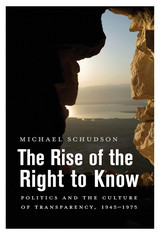

Some say it's simply information, mirroring the world. Others believe it's propaganda, promoting a partisan view. But news, Michael Schudson tells us, is really both and neither; it is a form of culture, complete with its own literary and social conventions and powerful in ways far more subtle and complex than its many critics might suspect. A penetrating look into this culture, The Power of News offers a compelling view of the news media's emergence as a central institution of modern society, a key repository of common knowledge and cultural authority.
One of our foremost writers on journalism and mass communication, Schudson shows us the news evolving in concert with American democracy and industry, subject to the social forces that shape the culture at large. He excavates the origins of contemporary journalistic practices, including the interview, the summary lead, the preoccupation with the presidency, and the ironic and detached stance of the reporter toward the political world. His book explodes certain myths perpetuated by both journalists and critics. The press, for instance, did not bring about the Spanish-American War or bring down Richard Nixon; TV did not decide the Kennedy-Nixon debates or turn the public against the Vietnam War.
Then what does the news do? True to their calling, the media mediate, as Schudson demonstrates. He analyzes how the news, by making knowledge public, actually changes the character of knowledge and allows people to act on that knowledge in new and significant ways. He brings to bear a wealth of historical scholarship and a keen sense for the apt questions about the production, meaning, and reception of news today.

The American founders did not endorse a citizen’s right to know. More openness in government, more frankness in a doctor’s communication with patients, more disclosure in a food manufacturer’s package labeling, and more public notice of actions that might damage the environment emerged in our own time.
As Michael Schudson shows in The Rise of the Right to Know, modern transparency dates to the 1950s, 1960s, and 1970s—well before the Internet—as reform-oriented politicians, journalists, watchdog groups, and social movements won new leverage. At the same time, the rapid growth of higher education after 1945, together with its expansive ethos of inquiry and criticism, fostered both insight and oversight as public values.
“One of the many strengths of The Rise of the Right To Know is its insistent emphasis on culture and its interaction with law…What Schudson shows is that enforceable access to official information creates a momentum towards a better use of what is disclosed and a refinement of how disclosure is best done.”
—George Brock, Times Literary Supplement
“This book is a reminder that the right to know is not an automatic right. It was hard-won, and fought for by many unknown political soldiers.”
—Monica Horten, LSE Review of Books

READERS
Browse our collection.
PUBLISHERS
See BiblioVault's publisher services.
STUDENT SERVICES
Files for college accessibility offices.
UChicago Accessibility Resources
home | accessibility | search | about | contact us
BiblioVault ® 2001 - 2024
The University of Chicago Press









